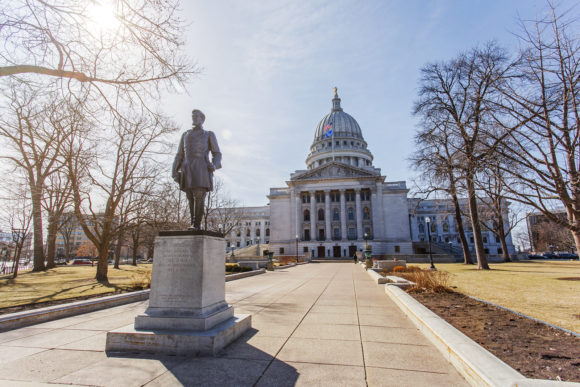MADISON, Wis. — Democratic Gov. Tony Evers proposed a multimillion dollar package of legislation Tuesday designed to control spring flooding, hoping to convince Republicans to reconvene the state Assembly to pass them.
Assembly Republicans adjourned their two-year session in February and aren’t expected to return to Madison until the 2021-2022 session begins in January. The Senate is scheduled to meet one last time this month before adjourning its two-year session but Republicans who control that chamber almost certainly won’t spend the floor session voting on anything coming from Evers’ office.
Kit Beyer, a spokesman for Assembly Speaker Robin Vos, said in an email to The Associated Press that the chamber’s floor session is over but that Vos might consider the bills next session if legislators from both parties can work together on them. Senate Majority Leader Scott Fitzgerald’s aide, Alec Zimmerman, had no immediate comment.
A Republican refusal to consider the bills could play into Evers’ hand; if flooding strikes the state hard this spring he could blame Republicans for not doing enough to stop it, scoring points with his base.
Evers’ spokeswoman, Melissa Baldauff, was already on the attack Tuesday. Asked how the governor might persuade the GOP to take up the bill, she answered by blasting Republicans for adjourning.
“Their constituents deserve to know they have decided to stop working and don’t want to answer questions about where they stand on policy,” Baldauff said. “Again, this is a self-imposed work stoppage. Nothing is preventing them from coming back in and getting things done.”
Evers declared a statewide state of emergency due to widespread flooding in March 2019. The National Weather Service on Monday warned of possible minor flooding this week along the Kickapoo River in southwestern Wisconsin. The Brown County Sheriff’s Department said Tuesday that rising water levels along the East River in Green Bay and its suburbs has closed some roads.
“I visited homes across our state last year and heard from the families who are asking us to help them prepare and prevent flooding, and to keep families and their homes, farms and businesses safe,” Evers said in a statement. “The state needs to start leading on this issue, and these bills are an important step at giving families and communities peace of mind and the tools they need to not only recover and rebuild, but to prevent flood damage in the future.”
The bills would create a new flood mitigation program within the Department of Transportation that would reimburse local governments up to half of their cost of modifying, replacing or relocating culverts and bridges at risk of flood damage. The Department of Natural Resources would get another $10 million to bolster its municipal flood program, which helps local governments build structures that collect storm water and groundwater.
Other bills in the package would give local governments more state aid for rebuilding flood-damaged highways, allow people to deduct the cost of flood insurance premiums from individual income taxes, and reduce local governments’ matching requirements for state disaster assistance.
The state Department of Agriculture, Trade and Consumer Protection would be authorized to borrow an additional $7 million for its soil and water resource management program, which funds grants to counties for land and water conservation work. The program’s total authorized debt would increase to $82 million.
Was this article valuable?
Here are more articles you may enjoy.


 Walmart to Pay $100 Million to Settle FTC Case on Driver Wages
Walmart to Pay $100 Million to Settle FTC Case on Driver Wages  Bayer to Make $10.5 Billion Push to Settle Roundup Cases
Bayer to Make $10.5 Billion Push to Settle Roundup Cases  Tesla’s Austin Robotaxis Report 14 Crashes in First Eight Months
Tesla’s Austin Robotaxis Report 14 Crashes in First Eight Months  Red Flags Adjusters Should Look for in Truck Accident Claims Investigations
Red Flags Adjusters Should Look for in Truck Accident Claims Investigations 